Diuretics (tablets, solutions) have become quite firmly established in our lives. They are used to correct the acid-base balance in the body. After all, they perfectly remove excess acid and alkali from it. Diuretic tablets, the list of which is quite impressive, are used in the treatment of poisoning, some injuries (especially when it comes to head injuries), and to combat hypertension. But, unfortunately, not everyone knows not only the mechanism of action of these drugs, but also the side effects that they can cause. And improper use of diuretics can lead to serious complications.
brief information
Diuretic tablets are used to treat many ailments. The list of effective drugs continues to grow today. Diuretics are also called diuretics.
Their main goal is to remove excess water, chemicals, and salts from the body, which tend to accumulate in the walls of blood vessels and tissues. In addition, diuretics have a positive effect on water-salt balance.
If a large number of sodium ions accumulate in the body, then subcutaneous tissue begins to be deposited. It has a very negative effect on the functioning of the kidneys, heart, and hematopoietic system. As a result, the patient develops a variety of diseases and disorders.
In addition, diuretics are in great demand in sports medicine. They are often used for weight loss. Very often, diuretics (tablets) are included in complex therapy to combat various ailments.
Based on their effect on the body, modern diuretics are divided into two main forms. The first category of drugs affects the process of urine formation directly in the kidneys. The second form of diuretics is responsible for the hormonal regulation of urine production.
What are the basic admission rules?
Only a specialist can choose the right diuretic. Unauthorized decisions to use diuretics lead to an imbalance of substances in the body. The doctor prescribes the drug based on the results of laboratory tests of urine and blood, as well as based on the patient’s existing complaints and illnesses. To monitor the effectiveness of the diuretic taken, the patient provides the attending physician with measured data. Based on the obtained figures, the doctor adjusts the dosage of the drug. Important among them are:
- the amount of liquid drunk and that which left the body;
- morning and evening pressure readings;
- volumes of swelling;
- patient's weight.
Return to contents
Important Warning
There is a lot of information that diuretic tablets, the list of which is given below, also easily solve cosmetic problems. However, many people believe that such drugs are completely safe. Some women take these medications on their own for weight loss purposes. Athletes widely use drugs before competitions in order to lose weight. Even bodybuilders use them, trying to create artificial dehydration so that the muscles look more prominent.
However, people who take diuretics without a doctor's prescription are at great risk. After all, treatment with diuretics can result in unpleasant consequences. You should know that diuretics can:
- Remove potassium from the body, thereby increasing human fatigue.
- Provoke salt deposition.
- Increase the risk of diabetes because they increase levels of “bad” cholesterol.
- Increase urination, causing sleep disturbance.
- Create problems for men with potency.
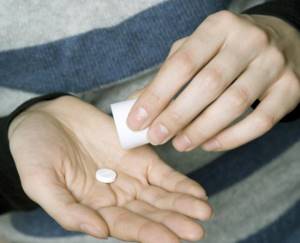
Quite often, even those patients who understand the risk believe that the newest drugs “Indapamide”, “Torasemide”, “Arifon” do not have a detrimental effect on metabolism. Such medications are indeed much better tolerated than older generation medications. However, they are also harmful to health. But the negative impact of these funds is revealed much later. It is enough to understand the mechanism of their action. Medicines of the new and old generation are aimed at one thing - stimulating the kidneys to work more intensively. Consequently, they excrete more salt and water.
It is important to understand that fluid retention in the body is a symptom of a serious illness. Swelling cannot occur on its own. It is provoked by serious disruptions in the functioning of the kidneys, heart, and sometimes other reasons. Consequently, diuretics are drugs (their list is very extensive) with exclusively symptomatic action. Unfortunately, they do not get rid of the cause of the disease. Thus, medications only delay the unpleasant ending for patients. Therefore, people who want to improve their health and fight a real disease should not make do with diuretics alone, much less use them themselves.
Pros and cons of using diuretics for weight loss
It is immediately necessary to understand that modern medicine is cautious about this method of losing weight. This is explained by the fact that a person will have to independently regulate the dosage, and he will also choose tablets depending on various reviews, or seeing the drug in an advertisement. But any medications that are used without the supervision of a specialist should not be joked about. Therefore, you need to accurately understand the issue before you start using the method.

Important! Before taking diuretics, it is advisable to first consult a specialist who will prescribe certain medications.
Only with a competent approach to the weight loss system can the following advantages of the method be highlighted:
- Swelling will disappear from the face in a fairly short time. This is an additional nice bonus.
- You can quickly get rid of about 3 kilograms of excess weight. Usually just a day is enough to achieve a similar result.
- In addition to losing weight, cleanse the intestines and kidneys.
- Your complexion will look natural.
Important! People who have correctly completed a course of weight loss with the help of a diuretic under the supervision of a specialist note that their sleep also improved, the body acquired unprecedented lightness, and endurance also increased, if we take into account physical activity.
The undoubted advantages of this method include the fact that diuretics cost very little money, and this is very important for many.
If a person suffers from heart problems, then this organ will work hard, pumping blood. As a result, fluid begins to accumulate in the tissues. Diuretics will help reduce the load on the heart and lower blood pressure. So, an additional action, in addition to losing weight, is stabilizing the body’s functioning.
Also, diuretics are useful not as the main method of losing weight, but as an additional aid in the diet. This way the result will be much better and of higher quality.
But, any weight loss product also has certain disadvantages. Diuretics are no exception, especially since their main purpose is not weight loss.
Flaws:
- Severe dizziness, vomiting and nausea may occur. If any of the symptoms appear, it is recommended to abandon the method.
- The heartbeat will increase greatly, or, conversely, slow down.
- When climbing stairs, you may experience severe shortness of breath, as well as a feeling as if there is not enough air.
Important! And the body will release not only fluid, but also microelements necessary for the human body. For example, if you take medications incorrectly, the result will be a lack of potassium. And this element is extremely important, since it is necessary for the normal functioning of the heart and blood vessels.
Doctors also claim that if you take diuretics without the supervision of a specialist, cramps may appear in the lower extremities, and the person will also feel distracted. A strong desire to sleep is another drawback of the method. In rare cases, vision loss is observed.
There is another danger: if you use diuretics for weight loss, you can achieve a state of dehydration, which in an advanced situation will lead to a fatal outcome.
Important! One of the main disadvantages in using this method is that it does not provide long-term results, it is called a one-time use. In a short time, it is indeed possible to lose several kilograms of your weight, but it can also quickly return if you fill the body with fluid.
Diuretics are strictly prohibited for use by pregnant women and during breastfeeding. Women may experience weight gain and swelling throughout pregnancy. If the kidneys and heart work without failure, then the reason is the accumulation of fluid and salt in the body.
Outwardly, it may seem that this is only a slight weight gain, but the woman understands that this is precisely swelling. That’s why he uses diuretic tablets. But in such a situation, the best option is to give up synthetic drugs and try natural remedies. And only plant extracts and essential oils are not prohibited. But it is easier and safer to solve the problem by eating fresh vegetables, fruits and berries. Using medications can harm not only your body, but also the health of the unborn child.
If a person decides to lose weight with the help of diuretics, it is necessary to additionally replenish nutrients in the body, and for this you will need to eat certain foods regularly:
- Fish.
- Potato.
- Milk.
- Honey.
- Bananas.
- Milk.

It is also important to know about the possible negative effects of drugs. Side effects are listed on each diuretic package:
- The occurrence of severe itching on the skin.
- Decreased potency.
- Arrhythmia.
- Nausea.
- Intense thirst.
- Anorexia.
- Hives.
Each type of diuretic has its own side effects. For example, you can study the list after using Torasemide:
- Severe diarrhea.
- The appearance of a rash in different parts of the body.
- Attacks of vomiting.
- Hearing problems.
To use diuretic pills for weight loss without harm to your health, you will have to follow several recommendations.
Classification of drugs
To this day, there is no single system according to which all diuretics are divided, since all drugs have different chemical structures and have different effects on the body systems. Therefore, it is impossible to create an ideal classification.
Often the division occurs according to the mechanism of action. According to this classification, there are:
- Thiazide drugs. They are excellent for treating hypertension and are excellent for lowering blood pressure. It is recommended to use them in parallel with other medications. Thiazides can negatively affect metabolism, so such diuretics are prescribed in small quantities. Drugs (a list of only the most popular ones is given in the article) from this group are “Ezidrex”, “Hydrochlorothiazide”, “Chlorthalidone”, “Indapamide”, “Hypothiazide”, “Arifon”.
- Loop means. They remove salt and fluid from the body due to their effect on kidney filtration. These medications have a rapid diuretic effect. Loop diuretics do not affect cholesterol levels and do not create preconditions for the occurrence of diabetes mellitus. However, their biggest drawback is the many side effects. The most common drugs are Torasemide, Furosemide, Ethacrynic acid, Bumetanide.
- Potassium-sparing agents. Quite an extensive group of drugs. Such medications help increase the excretion of chloride and sodium from the body. At the same time, the removal of potassium is minimized by such diuretic tablets. List of the most popular drugs: Amiloride, Triamterene, Spironolactone.
- Aldosterone antagonists. These diuretics block the natural hormone that retains salt and moisture in the body. Drugs that neutralize aldosterone promote fluid removal. At the same time, the potassium content in the body does not decrease. The most popular representative is “Veroshpiron”.
Read also: Medicine for cell restoration
Classification of diuretics
Treatment of different pathologies involves the use of drugs that have different effects. What kind of blood pressure pills are there:
- Drugs that affect the functioning of the renal tubular epithelium: Triamterene, Amiloride, Hydrochlorothiazide, Ethacrynic acid, Torasemide, Bumetamide, Flurosemide, Indapamide, Clopamide, Metolazone, Chlorthalidone, Methyclothiazide, Bendroflumethiazide, Cyclomethiazide.
- Potassium preserving drugs: Spironolactone (Veroshpiron).
- Osmotic diuretics: Monitol.
According to the degree of sodium leaching from the body, diuretics can be divided into:
- Ineffective, capable of removing 5% sodium.
- Having average efficiency, removing 10% sodium.
- With high efficiency, removing from 15% sodium.
The classification of new generation diuretics in pharmacology is varied. By analyzing their functions, it is easy to find a suitable and fast-acting medicine to solve individual problems.
Based on their origin, they are divided into natural - food, teas, tinctures and decoctions, and medicinal - drops, solutions, tablets for internal use, they can be found in pharmacies. According to the strength of impact, they are strong, medium intensity and light.
According to the duration of long-term use, short-term and “ceiling”.
There are several types of diuretic drugs, differing in their mechanism of action, used in the treatment of various pathologies.
There are three types of diuretics:
- Affecting the functioning of the epithelial tissue of the renal tubules. The group of these drugs includes the following: Triamterene, Hydrochlorothiazide, Bumetanide, Cyclomethiazide, Chlorthalidone, Bendroflumethiazide, Ethacrynic acid, Clopamide, Methyclothiazide, Amiloride, Metolazone, Furosemide, Indapamide, Torsemide.
- Calcium-sparing, related to aldosterone (mineralocorticoid) receptor antagonists. Diuretics of this type include Spironolactone, which is known under the trade name Veroshpiron.
- Osmotic, for example, Mannitol (Monitol).
Diuretics are classified not only by their mechanism of action, but also by the degree of sodium leaching:
- highly effective (washing out over 15%);
- average efficiency (10%);
- ineffective (5%).
Medicines for edema
For good effect, potent agents can be used. The following diuretic tablets are used for edema:
- "Torasemide";
- "Furosemide";
- "Piretanide";
- "Xipamide";
- "Bumetanide".
The above drugs are recommended to be taken in short courses. Be sure to take a break between doses. This eliminates the body’s addiction to medications and prevents the pronounced therapeutic effect.
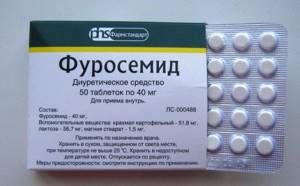
Medium-strength diuretic tablets can also be used for edema:
Such drugs are used for a long time and continuously. The recommended dose is determined by the attending physician. As a rule, it is about 25 mg per day.
For minor edema, potassium-sparing diuretics, such as Spironolactone, Amiloride, and Triamterene, are more suitable. They are taken in courses (2-3 weeks) at intervals of 10-14 days.
How to take a diuretic without harm to the body?
Diuretics are classified according to their principle of action. There are thiazide, loop, potassium-sparing and natural diuretics. The rules of administration and the corresponding dosages depend specifically on the class of diuretic. The prescription of a specific type of diuretic is determined by the patient's disease.
Thiazide diuretics
Sodium and chlorine salts are removed. With prolonged use, the strength of action does not decrease, and addiction to the diuretic does not occur. The visible effect of the product occurs within 2 hours. Diuretic tablets are effective for 12 hours. Treatment rules:
- After a week of use, it is recommended to take a break of at least 4 days.
- Treatment begins with minimal doses to prevent adverse reactions.
- Along with diuretics, a diet with a high potassium content is prescribed.
Medicines for hypertension
Diuretic medications that are used for high blood pressure fall into two categories:
- Remedies that have a quick effect. Such drugs are used during a hypertensive crisis, when there is a need to quickly reduce blood pressure.
- Products for daily use. Medicines help maintain optimal blood pressure levels.
Potent medications can stop a hypertensive crisis. The most popular drug is Furosemide. Its price is low. The following remedies are no less effective during a crisis:
- "Torasemide";
- "Bumetanide";
- "Ethacrynic acid";
- "Piretanide";
- "Xipamide."
The duration of taking the above medications can be 1-3 days. After stopping the crisis, they switch from such potent drugs to medications that can maintain blood pressure at the required level every day.
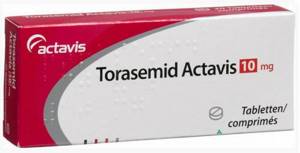
The second category includes means of medium impact. The most popular drugs are:
These medications are taken daily as prescribed by your doctor. They perfectly maintain the optimal pressure level.
How often to take and how to get off a diuretic?
Abrupt refusal of diuretics leads to complications.
Stopping the use of diuretics should be gradual. This is especially true for patients with unstable blood pressure. Abrupt refusal of diuretics leads to complications of existing diseases. To properly stop using medications, you should gradually reduce the dose. The schedule for how much is better to take, how often and when to stop is drawn up by the attending physician.
Return to contents
Drugs for heart failure
As a result of this pathology, fluid retention in the body often occurs. This phenomenon creates stagnation of blood in the lungs. The patient exhibits many unpleasant symptoms, such as shortness of breath, swelling, enlarged liver, and wheezing in the heart.
For people with heart failure, the doctor must introduce a diuretic into therapy. It perfectly prevents severe consequences such as pulmonary edema and cardiogenic shock. At the same time, diuretics increase patients' tolerance to physical activity.
For patients with the first and second degrees of the disease, a good diuretic is a thiazide drug. In case of more serious pathology, the patient is transferred to a strong drug - a loop diuretic. In some cases, the drug Spironolactone is additionally prescribed. It is especially important to take such a remedy if the patient has developed hypokalemia.
If the effect of using the drug Furosemide weakens, cardiologists recommend replacing it with the drug Torasemide. It has been noted that the latter remedy has a more beneficial effect on the body in severe forms of heart failure.
How to replenish potassium loss
Under normal conditions, when you do not suffer from kidney disease, hypertension, edema of various natures, you do not often engage in grueling training or heavy physical work with intense sweating, potassium from food is enough for you. Good sources of potassium include tea, natural coffee, cocoa powder, all nuts and sunflower seeds, and raisins. Instead of sodium salt, you can use preventive food salt containing potassium salts. The daily intake of potassium for an adult ranges from 2 to 4 grams. For significant physical activity – up to 5 grams. In total, a woman’s body should contain approximately 225 g of potassium, and a man’s body should have 250 g.
A whole series of drugs has been developed to simultaneously restore the balance of potassium and magnesium. The drug “Potassium-magnesium aspartate” and others like it restore electrolyte balance, replenish potassium and magnesium reserves, and normalize metabolic processes. The drugs “Aspangin”, “Asparkad”, “Asparkam” have a similar effect.
If you are taking triazides diuretics or diuretic herbs, you should then replenish your potassium balance with the help of Asparkam and Panangin. If you take a diuretic and Asparkam together, this will protect you from potassium loss. One Asparkam tablet contains 14.3 mg of potassium. The Panangina tablet contains 36.2 mg.
The selection of drugs should be entrusted to a doctor, because their combinations and mutual influence, if chosen independently, can lead to an overdose of potassium and harmful consequences for the entire body.
Swelling is a common phenomenon that can be associated both with chronic diseases and with the weather or indulging in salty foods before bedtime. In fact, to cope with it, you need to drink as much clean water as possible. It sounds incredible, but it really works: the body understands that it is not going to be deprived of its most important component, and therefore stops storing water, returning you to a decent appearance. But much more often, instead of drinking plenty of fluids, people resort to diuretics to get rid of edema. We’ll tell you why you don’t need to do this right now.
They are taken under the supervision of a professional
Any pills, including diuretics, require consultation with a specialist before taking them. Yes, diuretics are indeed indicated for some people, but if you self-medicate, problems in the future cannot be avoided. In addition to removing excess water from the body, diuretics deprive it of minerals, which, in turn, if you are addicted to such drugs, guarantees you weakness and difficulty concentrating, and in the long term - constant cramps, problems with bones and kidneys. Diuretic tablets may be recommended for patients with hypertension, heart failure and idiopathic edema. But only if they were prescribed by the attending physician and in a strictly prescribed dosage.
Diuretics can be addictive
Although most studies indicate that diuretics are not addictive, they can be dangerous in terms of psychological dependence. The problem here is represented by diuretics, which the patient takes in order to maintain a “beautiful figure” - that is, to combat excess weight. And this obviously doesn't work (we'll explain why below). But for those who have already started taking diuretics due to an eating disorder, it doesn’t seem so. In fact, along with a pack of pills, they get the opportunity to eat spicy, fatty and salty foods at night, and when they wake up, they see in the mirror not a swollen face, but wide-open eyes and defined cheekbones. Only each time the number of tablets in your hand will increase. Until it all ends in a hospital room.
Important: exceeding the dosage can lead to dehydration and loss of electrolytes, rapid heartbeat, weakness throughout the body, and severe dizziness. And this, keep in mind, is just the beginning.
No, they don't help you lose weight...
Diuretics create the illusion that excess weight goes away along with the water. But the truth is that they expel water from the body, not fat. The latter stays with you, so in the absence of physical activity and a balanced diet, nothing, of course, will change. Moreover, our body needs water for optimal metabolic processes, so its lack in the body will slow down digestion and provoke intestinal problems that will have to be addressed in the doctor’s office. By the way, it is for this reason (illusory weight loss) that people with anorexia and bulimia often get hooked on diuretics. It seems to them that if they stop taking the pills, their appearance in the morning will shock those around them. Of course, swelling cannot be avoided when you stop taking it: but just wait a few days until the kidneys start working again. And you will see in the mirror not a “horror”, but a completely normal person.
...But they will “help” you type it with ease
Yes, we were not mistaken. And you were not mistaken when you read this. If you take a particular diuretic for a long period, your kidneys will eventually compensate for its use. And the weight of water that will accumulate in the body when you stop taking it will be many times greater than it was initially. And this, quite logically, will cause the needle on the scale to seriously deviate to the right. This is called "diuretic edema," which happens when the kidneys begin to retain more sodium and water in the body in fear of being deprived of both again. As we have already said, the best solution here is to wait a little. And, of course, go to an appointment with a nephrologist as soon as possible to eliminate any possible risks.
It is no secret that when taking diuretics and drugs with the same effects, potassium is washed out of the blood. How and with what can you compensate for the resulting potassium deficiency in the body?
It is not always necessary to replenish potassium. Some of the diuretics that are currently used for treatment are potassium-sparing diuretics. These are Veroshpiron, Spironolactone, Renial and others. When treating them, you do not need to take any additional medications, as no loss really occurs. But if a person constantly drinks diuretics from other groups, especially if they take such a powerful drug as Furosemide, then he needs to replenish microelements. The most popular options are imported Panangin and domestic Asparkam. They are available in two forms - tablets and injection solution.
The drug "Furosemide"
The medicine is a fast-acting diuretic. Its effect occurs after taking it for 20 minutes. The duration of the drug's effect is about 4-5 hours.
This remedy is effective not only for stopping a hypertensive crisis. According to the instructions, the medicine helps with heart failure, swelling of the brain and lungs, and chemical poisoning. It is often prescribed for late toxicosis during pregnancy.
However, the product also has strict contraindications. The drug is not used in the first trimester of pregnancy. It should not be used by patients with renal failure, people who have hypoglycemia, or urinary tract obstruction.
The cost of the drug "Furosemide" is low. The price is approximately 19 rubles.
Read also: Essay on the dangers of smoking
Is it possible to take diuretics during pregnancy?
Expectant mothers need to know that it is prohibited to drink diuretics without permission during pregnancy! Prescribing even “harmless” herbal preparations to yourself can lead to electrolyte imbalance and cause significant harm to mother and baby. Diuretics lead to disruption of the uteroplacental circulation, thrombosis of placental vessels, disruption of fetal development, etc. Synthetic drugs can be prescribed in extreme cases in recent months. For example, to relieve a hypertensive crisis at risk of pulmonary edema.
If necessary, doctors prescribe Canephron to pregnant women, which is made from medicinal herbs (rosemary, lovage, centaury). Phytolysin is also used, but only if the pregnant woman does not have inflammation in the kidneys. Under the supervision of a doctor, for edema, take the bronchodilator drug Eufillin, which has a diuretic effect.
Pregnant women should also take herbal decoctions with caution. It is forbidden to drink juniper tea, which can cause uterine contractions. Plants such as parsley and strawberry leaves are contraindicated. It is allowed to take tea from lingonberry leaves, horsetail, birch leaves and buds.
The drug "Torasemide"
The medicine is a fast-acting remedy. The drug "Furosemide" undergoes biotransformation in the kidneys, so it is not suitable for all patients. A more effective medicine for people suffering from kidney diseases is the drug "Torasemide", since it undergoes biotransformation in the liver. But with pathologies of this organ, the medicine can cause serious harm.
After just 15 minutes, the effect on the body begins (as stated in the instructions for use attached to the drug "Torasemide"). The price of the product varies from 205 to 655 rubles.
Long-term studies have confirmed the high effectiveness of the drug in heart failure. In addition, the drug perfectly removes salts and liquid. At the same time, the loss of potassium by the body is insignificant, since the effective remedy blocks the hormone aldosterone.
Why doesn't a diuretic help?
The causes of swelling are various diseases. To maximize the effect of a diuretic, it is necessary to clearly determine which disease was the root cause of fluid retention in the body. Only after making a diagnosis can a specialist prescribe a diuretic that will bring the most pronounced results. One of the reasons for its ineffectiveness is the site of action of the drug. Loop diuretics are closer to the kidney and have the most effective effect. The second most effective are thiazide drugs. The effect of potassium-sparing diuretics occurs later than others. A diuretic drug that will help the patient as much as possible should be prescribed by the attending physician. Self-medication leads to complications of diseases.
The drug "Indapamide"
The medicine is very effective for hypertension (severe and moderate). The product perfectly reduces blood pressure and maintains its optimal level throughout the day. In addition, it prevents an increase in this indicator in the morning.
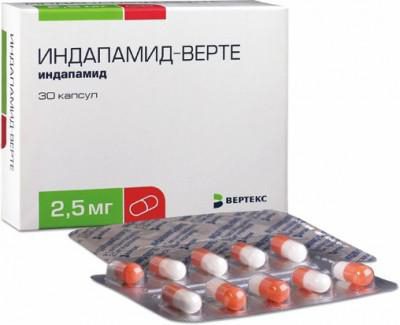
You need to take the medicine once a day, 1 tablet, as evidenced by the instructions included in the drug “Indapamide”. The price of the product varies on average from 22 to 110 rubles.
Before taking it, you should familiarize yourself with the contraindications, since this excellent remedy is not suitable for all patients suffering from hypertension. The drug is not intended for people who have problems with the kidneys or liver. Pregnant and nursing mothers are prohibited from taking the medicine. In case of cerebral circulation failure, anuria, hypokalemia, the drug is contraindicated.
Folk remedies for weight loss at home
Folk diuretics are also used for weight loss at home. These are mainly mixtures of herbs.

Recipes:
- To prepare this folk diuretic, you need to mix basilisk flowers, bearberry leaves, and licorice root in a ratio of 1 to 3 to 1, respectively. After mixing, 1 tablespoon is filled with boiling water and cooled for 30 minutes. After this, the drug is well filtered. To effectively lose weight, it is advisable to take it 3 times a day, one small spoon.
- For the second good infusion you will also need bearberry leaves, juniper, and licorice root. The correct ratio is 4 to 4 to 1. Preparation is no different from the previous version, as is the method of consumption.
- Horsetail and birch leaves are mixed in a one to one ratio. Two tablespoons are filled with two small glasses of boiling water, and then cooled. The last step is straining. You need to consume 0.5 cups about 3 times a day.
- Juniper berries are mixed with horsetail and wheatgrass root in a ratio of 2 to 2 to 1. A tablespoon is placed in boiling water and left for about a quarter of an hour or a little more. After this, the product is carefully filtered. You need to take one tablespoon three times a day. But it is advisable to use this infusion only after consulting your doctor, since it is not harmless.
Important! It is prohibited to add anything of your own or change the dosage.
The drug "Triamterene"
The medicine is a mild diuretic. It is recommended to use it in combination with another diuretic drug, Hydrochlorothiazide. Thanks to this combination, it is possible to reduce the loss of potassium by the body. The drug Triamterene has a beneficial effect. The instructions position it as a potassium-sparing agent.
The medicine should be used strictly according to the prescribed dosage. People with impaired kidney function may experience an unpleasant side effect: increased potassium levels. Sometimes the product can lead to dehydration. When interacting with folic acid, the medicine helps increase red blood cells.
The cost of the product is 316 rubles.
Adverse symptoms of diuretic use
Self-medication and incorrect dosage of a diuretic drug can cause negative health consequences. This happens due to excessive excretion of calcium and potassium salts along with the liquid. As a result, disturbances in the functioning of the heart and kidneys occur. Against the background of a deficiency of these elements, arrhythmia, fatigue and muscle cramps are observed. Patients also report headaches, increased sweating, unreasonable anxiety, sore throat and cough. An allergy to the components of a diuretic drug causes a rash and itching. When taking a diuretic at night, insomnia may occur due to frequent urination. It is often not recommended to use a diuretic, as it will have the opposite effect - dehydration.
The drug "Spironolactone"
The medicine is a potassium- and magnesium-sparing agent. At the same time, it effectively removes sodium and chlorine from the body. After starting to take the drug, the diuretic effect occurs approximately 2-5 days.
The medicine can be prescribed for hypertension, chronic heart failure, liver cirrhosis, nephrotic syndrome. The use of Spironolactone is effective for swelling in the 2nd and 3rd trimester of pregnancy.
The drug is not intended for people diagnosed with diabetes mellitus, renal or liver failure, or anuria. It is forbidden to use the product in the first trimester of pregnancy. In case of hyponatremia, hyperkalemia, hypercalcemia, the drug is contraindicated. It should not be administered to people with Addison's disease.
Side effects may also occur when taking the medicine. In some cases, the drug provokes urticaria, itching, drowsiness, headache, diarrhea or constipation.
The cost of the product is about 54 rubles.
Diuretic Triampur: how to take diuretic tablets
The drug Triampur is a combined action drug that removes excess fluid from the body, while reducing high blood pressure.
Triampur can only be used after being prescribed by the attending physician, since it contains a large number of contraindications that cannot be neglected.
The presence of triamterene in the composition ensures the conservation of potassium during fluid removal.
What is Triampur made of?
Triampur diuretic is available in the form of yellow and round tablets. All tablets are placed in a glass bottle with an opaque white stopper. When manufactured, one pack contains 1 bottle.
Loading …
The tablets contain the active ingredients triamterene and hydrochlorothiazide, as well as other components: potato starch, milk sugar, sodium starch, food emulsifiers E-572, silicon dioxides.
Pharmacology
Triampur is a diuretic drug that delays the removal of calcium and uric acid from the blood plasma. When ingested, it does not affect normal blood pressure, reducing only elevated levels. With high blood pressure, the reduction occurs only after 3 days, but in some cases it may take up to a month.
The main effect of the drug is diuretic, it occurs two hours after administration and lasts for 11 or 12 hours. The diuretic is absorbed by the body by 30-70%, and hydrochlorothiazide by 60-80%. The drug is excreted through the intestines, some of it enters the kidneys. The half-life is approximately 4 hours.
Indications for use
Triampur is a potassium-sparing diuretic that reduces the permeability of cell membranes to sodium ions, especially in the area of the distal tubules. There is also an improvement in their removal from the body along with urine without loss of potassium.
More on the topic: Is the drug Furadonin a diuretic?
Doctors prescribe Triampur for high blood pressure and the presence of edema in a patient of various origins.
Are there any contraindications for the drug?
It is necessary to avoid taking this diuretic if you are individually intolerant to its active substances or components in the composition. Experts do not recommend taking Triampur for chronic kidney dysfunction, acute glomerulonephritis, or insufficient urine flow into the bladder.
Triampur is also contraindicated in patients with high concentrations of potassium in the blood and in cases of hepatic coma. During pregnancy and breastfeeding, as well as for children under 14 years of age, analogues of the drug should be selected.
The drug should be taken with extreme caution by patients with impaired renal function, liver disease, urolithiasis and gout, diabetes mellitus, liver cirrhosis, folic acid deficiency, as well as those under the age of 18 years.
How to take Triampur?
The tablets should be taken orally after meals, without crushing or chewing, along with plenty of liquid. For swelling, Triampur should be taken with 1 tablet 2 times a day. If the symptoms are severe, you can increase the dosage to 4 tablets in 2 doses, morning and evening. Then the medicine is taken two tablets with a break of one or two days.
When treating hypertension, Triampur should be taken one tablet in the morning after meals. Further dosage is selected by the doctor, but the maximum dose of the drug is 4 tablets per 24 hours. In case of kidney dysfunction, it is optimal for the patient to take the drug one tablet per day.
Side effects
Some patients may experience unpleasant symptoms after taking the diuretic drug Triampur: vomiting and nausea, abdominal pain, difficulty emptying the bladder, severe thirst and dry mouth, headache and cramps, intestinal colic.
More on the topic: Is Eufillin a diuretic?
There is increasing nervousness, drowsiness, apathy, headaches, rapid heartbeat, irregular heart rhythm, muscle weakness and confusion, anemia, decreased hearing and visual acuity, allergic skin rashes, itching, a sharp decrease in blood pressure, and jaundice on the skin.
If a patient has abused a diuretic drug for any reason, it is necessary to know the symptoms of an overdose. The most dangerous of them is a sharp decrease in pressure and forced diuresis.
Increased excitability and fatigue of a person are also noted.
If you abuse the medicine for a long time, the body becomes intoxicated, electrolyte volume and blood circulation are disrupted.
If unpleasant symptoms occur during an overdose, it is necessary to stop taking the drug, rinse the stomach and take drugs with an enterosorbing effect. It is also important to pay attention to water-electrolyte imbalance and take all measures to compensate for fluid loss.
Interaction with other drugs
- Taking Triampur with drugs against high blood pressure, diuretics or tricyclic drugs from the group of antidepressants, ethanol-containing drugs or vasodilators is accompanied by an increased effect in patients from drugs to lower blood pressure;
- If the drug is used with ACE inhibitors, then at the very beginning of therapy, blood pressure may drop sharply;
- When taking Indomethacin and Triampur, some patients may experience renal failure;
- When Triampur is combined with salicylates, toxic reactions from the patient’s nervous system become frequent;
- When combined with methyldopa drugs, hemolysis develops;
- If Triampur is taken as a diuretic along with potassium salts or potassium-sparing diuretics are taken, hyperkalemia may occur;
- The combination of Triampur and Chlorpropamide causes hypokalemia;
- When taking the drug, excessive excretion of quinidine and an increased effect of a group of cytostatics on the bone marrow are often observed;
- A sharp decrease in potency is observed when beta-blockers are recombined with Triampur.
More on the topic: Is Cyston a diuretic or not?
Special instructions when taking Triampur
If you need to take the drug for a long time, you should regularly monitor your blood for glucose, uric acid, chlorine and sodium. If a patient is deficient in vitamin B9, blood should be checked as often as possible.
Taking Triampur reduces a person's reaction rate, so hazardous activities and driving should be avoided. If you miss a morning or evening dose, do not take two tablets at the next dose.
Storage conditions and periods
Triampur should be stored in a cool place away from sunlight. The temperature should not exceed 30 degrees Celsius, shelf life is 3 years. After the expiration of time, disposal is necessary.
responded with an error: Access Not Configured. Data API has not been used in project 122068193747 before or it is disabled. Enable it by visiting https://console.developers.google.com/apis/api/.googleapis.com/overview?project=122068193747 then retry. If you enabled this API recently, wait a few minutes for the action to propagate to our systems and retry.
Rate this post: Loading…
Source: https://onefr.ru/lechenie/lekarstva/printsip-dejstviya-mochegonnogo-sredstva-triampur.html
Reviews about diuretics
Many patients are interested in the opinions of those people who are already taking diuretic pills. Reviews usually contain information about effectiveness and side effects.
People facing a hypertensive crisis confirm that the drug Furosemide can help very quickly and effectively. However, at the same time, they emphasize that the drug should be used only as prescribed by a doctor and in recommended doses.
The effectiveness of the product is also confirmed by pregnant women who use the drug in the last months of pregnancy. Patients claim that it perfectly relieved swelling.
However, abusing the drug is strictly prohibited. After all, the drug "Furosemide" is quite easily addictive. In addition, the product removes potassium from the body. After long-term use, patients may experience seizures.
The drug “Indapamide” is in high demand. Hypertensive patients are often prescribed this remedy. There is an opinion among patients that the medicine is well tolerated by the body. In this case, the diuretic effect is favorable. There are no negative opinions about the drug.
The drug Torasemide has a good effect on the body. Patients who take the drug strictly as prescribed by a doctor and under his supervision say that the drug is very effective. It perfectly relieves puffiness. At the same time, patients do not experience any problems in the form of side effects.
Other diuretic tablets also bring favorable results to the body. Reviews of the drug Spironolactone indicate a strong diuretic effect. However, patients claim that the drug should be used only as prescribed by a doctor and in appropriate doses.
Read also: Reception department of a drug treatment clinic
Reviews
Having studied more than 10 sites with reviews of real people on diuretic drugs, we came to the conclusion that these drugs really help to effectively lose weight in just one day after use. Many users who tested the method on themselves note that they lost about 3 kilograms of excess weight. And this result came in just one day. But there are reviews with less results. It all depends on the individual characteristics of the person and his initial weight.
Users also note the low price for the drugs. And for many people, this is a fairly important factor when choosing a weight loss product.
The best part is that even when using strong drugs, people's appetite does not increase. Usually, during a course of diets, citizens who are losing weight suffer from a constant feeling of hunger - they have to control themselves so as not to eat too much. Reviews say there is no problem with this.
These are the most positive reviews, but there are also negative ones. They say that certain difficulties arose from various drugs (in the form of tablets). This is why it is recommended to use diuretics (even mild ones) only with the consent of a specialist. If you select them yourself, you can harm your body. To avoid this, people try to take folk remedies and note that they do not have a negative effect if they take everything according to the prescribed dose.
For more information about diuretics for weight loss, watch the video:
Doctor's recommendations
Before taking a diuretic, be sure to tell your doctor about all the medications you are taking. In addition, an important factor in selecting the necessary medicine is the presence of chronic ailments. You should not take such medications without permission. It is necessary to strictly follow the doctor's instructions. Take the drug at the appointed time (this will avoid unpleasant awakenings at night) and only in the dosage that was prescribed to you. Such simple truths will allow you not to experience the severe consequences of taking diuretics.
Diuretics (otherwise known as diuretics) are a group of substances with different structures, the main effect of which is aimed at increasing the volume of fluid excreted. Diuretics are used in the complex treatment of hypertension and other pathologies of the cardiovascular system, liver and kidney diseases, and other disorders and conditions accompanied by swelling of tissues and organs. We will help you understand the complex classification of drugs and choose a good diuretic.
Based on their origin, there are natural remedies with a diuretic effect (herbal decoctions, some foods, drinks) and medicinal diuretics, which, depending on the structure and mechanism of action, are classified into five groups: loop, thiazide, potassium-sparing, carbonic anhydrase inhibitors and osmotic. The last group of drugs is the most powerful diuretics, which are used only in hospitals and are administered intravenously for various acute conditions that threaten the patient’s life.
Rules for taking diuretics
Only a doctor can prescribe any diuretic medications, even those of natural origin. He should also familiarize the patient with the rules for taking diuretics:
- synthetic diuretics are almost never prescribed to pregnant women; they are replaced with natural ones or prescribed a diet with diuretic products,
- When taking diuretics, you must follow a drinking regime, drink 1.5-2 liters of water,
- when using synthetic diuretics, which strongly wash away potassium and magnesium, it is necessary to restore their content in the blood with the help of vitamin-mineral complexes,
- To get rid of swelling of the face and area under the eyes, you should not use strong diuretics (loop and thiazide).
For swelling of the legs, taking diuretics must be combined with massage, physical activity and diet. If side effects appear (headaches, pressure surges, kidney discomfort, indigestion), it is necessary to stop the course of diuretics.
Diuretic drugs are an indispensable element in the treatment of edema of various origins. The abundance of drugs allows you to choose the right remedy for each problem. There are two main types of diuretics: natural and synthetic (thiazide, potassium-sparing and loop). Each of them has its own advantages and disadvantages, which the patient should become familiar with before taking it.
Loop diuretics
Loop diuretics (also known as “ceiling diuretics”) are potent drugs. They are used to relieve hypertensive crisis, eliminate edema of various origins, remove toxins from the body in case of poisoning with drugs or toxic compounds. Main indications for use:
- chronic heart failure;
- any degree of chronic renal failure;
- nephrotic syndrome;
- cirrhosis of the liver, accompanied by swelling, ascites (accumulation of fluid in the abdominal cavity).
Loop diuretics for swelling of the face, legs, arms and other parts of the body are prescribed 5–20 mg per day until the swelling disappears (but not longer than 3 days). Repeated use for chronic edema is allowed after a break, which should last at least 2-4 weeks.
Advantages
Loop diuretics are available in tablets and solutions for injection, which allows you to choose the optimal method of administration for a particular case (intravenous administration is carried out only in severe condition of the patient). They are distinguished by the rapid onset of the therapeutic effect - the effect develops 30–90 minutes after administration and lasts from 2 to 6 hours. The drugs reduce swelling, reduce the volume of extracellular fluid, and have a positive effect on respiratory function, reducing shortness of breath.
Flaws
Strong diuretics are taken once or in short courses, with breaks, and are not suitable for long-term treatment. With daily use of loop diuretics, addiction develops and their therapeutic effect weakens. Loop diuretics are characterized by a powerful but short-lasting action, therefore they are suitable only for stopping a hypertensive crisis, but not for the treatment of hypertension.
Another significant drawback is the removal of sodium and potassium ions along with the liquid, leading to disruption of the water-electrolyte balance and the development of severe adverse reactions (severe decrease in blood pressure, convulsions, encephalopathy, arrhythmia, hearing impairment up to deafness with intravenous administration, etc.).
Any medicine taken without indications is of no benefit. Diuretics are prescribed strictly according to indications and only those that are necessary in the current clinical situation. Diuretics of different groups with different side effects are used. Furosemide or Lasix, the most powerful, removes potassium and inhibits the reabsorption of sodium and chlorine. A decrease in potassium can be dangerous and cause heart rhythm disturbances and seizures, but without Lasix it is impossible to treat heart failure, pulmonary edema, and hypothiazide is included in many medications used to treat blood pressure.
There is a class of potassium-sparing diuretics - this is veroshpiron, one of the known side effects when taking it is gynecomastia, another representative of this group of drugs is already devoid of this side effect.
A group of osmodiuretics prevent the reabsorption of water in the kidneys; they are used in emergency situations to cause forced diuresis.
Carbonic anhydrase inhibitor drugs, most often represented by diacarb. They reduce the absorption of bicarbonates and sodium ions, increase diuresis and perfectly alkalinize urine.
How to take diuretics (diuretics and tablets) correctly?
: 19 Nov 2014, 15:05
loading...
Before taking diuretics for edema, you need to consult a doctor about the problem and find out the cause of fluid retention. You should not use diuretics yourself, as they change the salt balance, thereby causing adverse reactions.
It should also be noted that swelling is only a symptom of a disease. It is impossible to manage with diuretics alone.
Therefore, how to properly take diuretic tablets should be consulted with a specialist who, taking into account the interaction of drugs, the patient’s condition and his concomitant diseases, will select the correct dosage and time of administration.
What should the patient consider?
To take diuretics correctly, you must adhere to the basic principles. Every day you need to measure the following parameters and write them down in a notebook:
- Monitoring fluid intake and excretion throughout the day.
- Blood pressure measurement (morning, evening).
- Measure body weight.
- Measure the volume of the abdomen and legs (depending on the location of the edema).
All this data must be provided to your doctor so that in the future he can adjust the dosage of the drug, replace it with another, or add another medicine. If you feel unwell (dizziness, nausea or other negative sensations), you should immediately notify your doctor.
Not all diuretics have the same mechanism of action. Among them there are: potassium-sparing (Vershpiron, Triamterene), loop (Furosemide), thiazide (Hypothiazide), herbal. To understand how to take diuretics correctly, you need to know the pharmacodynamics of each group.
Thiazide diuretics
loading…
loading…
loading…
The action of thiazide diuretics is based on the removal of sodium, chlorine and, to a lesser extent, potassium. The advantage of the drugs is that they are not addictive. Even long-term use does not weaken the diuretic effect. But despite this, it is not recommended to take it for more than 7 days in a row. If necessary, take a break of 4 days and resume treatment.
Thiazide drugs are rapidly absorbed and begin to act within 2 hours. A single dose of the tablet prolongs the diuretic effect for up to 12 hours.
Thiazides are usually prescribed in small doses to reduce side effects.
To prevent the leaching of potassium salts, it is recommended to follow a diet that includes dried apricots (peach or apricot), bananas, baked potatoes, prunes and other foods high in potassium.
Loop diuretics
The diuretic effect after taking loop diuretics occurs very quickly. After taking the tablets, fluid removal begins within an hour and lasts about four hours.
But such an effect on the body increases the risk of disrupting the ion balance. To avoid complications, it is recommended to use potassium supplements (Asparkam, Kalinor, Panangin).
Long-term use of loop diuretics requires correction of potassium metabolism.
It is correct to take fast-acting diuretic tablets once in the morning. It is not recommended to exceed the prescribed dose. There are active and maintenance phases of treatment with loop diuretics. Begin therapy with a moderate dose, which is gradually increased if necessary. The maintenance phase consists of continuously taking medications.
Potassium-sparing diuretics
Potassium-sparing diuretics remove sodium along with urine and completely retain potassium content. Therefore, when taking diuretics of this group, drugs that replenish potassium are not prescribed. The diuretic effect may occur after 2 hours. It is usually recommended to take diuretics once a day during the day. If the level of urea in the blood increases, the drug is taken every other day.
Some diuretics of this group (Spironolactone, Veroshpiron) exhibit a diuretic effect only on day 2. Typically, such drugs are combined with other diuretics when potassium loss is undesirable. If you need to take the medicine 2 times a day, then take the first dose in the morning and the second in the afternoon. Herbal diuretics
For kidney disease and the appearance of edema, diuretics based on medicinal herbal extracts (Canephron N, Cyston, Fitolysin, Urolesan) are prescribed.
The dosage and frequency of administration should be prescribed by the doctor depending on the patient’s problem. If a diuretic is prescribed in solution, then the required dose must be diluted with water before taking.
To soften the unpleasant taste, you can dilute it with other liquids (juice, compote).
If diuretics in the form of a paste (Phytolysin) are prescribed, take them correctly after dissolving them in warm water. The resulting suspension is drunk after meals. During therapy with herbal diuretics, irritating foods (spices, smoked meats, marinades) are excluded from the diet and the volume of liquid is increased to 2 liters. If allergic reactions occur, the drugs are discontinued.
loading…
loading…
loading…
Interesting materials on this topic!
18 Nov 2014, 17:50 Safe and natural diuretics Diuretics for edema, presented today in huge quantities by various pharmaceutical companies, help to quickly remove...
19 Nov 2014, 14:37 Folk diuretics The kidneys perform the function of the body’s natural filters, which are involved in the process of cleansing the body and regulating the water-salt balance. As soon as…
20 Nov 2014, 12:06 How much diuretic can you drink? Excessive accumulation of fluid in the body is a problem that is solved in modern medicine by prescribing diuretics. Enough... November 20, 2014, 1:11 pm Please advise a diuretic Edema in the minds of many is initially associated with diuretic drugs.
Is it possible to take diuretics if there is a delay... November 20, 2014, 13:37 If diuretics do not help Fluid retention in the body occurs for various reasons. Inflammatory diseases of the urinary system, heart failure, disorders…
loading…
loading…
loading…
Elena – 10 Aug 2021, 08:56
I have heart failure, I take a lot of diuretics, which causes terrible constipation, apparently all the water leaves the gastrointestinal tract, I no longer have the strength! What to do, but you can’t give up diuretics.
loading…
Source: https://www.diuretiki.ru/interesnye-fakty-o-mochegonnyh/kak-pravilno-prinimat
Is it possible to lose weight while taking Furosemide?
Furosemide promotes weight loss without special restrictions on food and heavy physical activity. Weight is lost due to the removal of excess water from the body. However, it is worth noting that in the absence of physical activity and without adjusting the diet, it will not be possible to maintain the result for a long time. Lost kilograms may return in just a couple of days, as the body regains its previous level of fluid.
How many days should I take the drug? Many doctors note that the maximum duration of use should not be more than 2-3 days, but the safest period is considered to be one day. During this time, you must strictly adhere to the dosage, which is set to take no more than 3 tablets. The break between each dose should be 3-4 hours. If the solution is administered by injection, then it must be done intravenously over 2-3 minutes. Sometimes intramuscular administration is allowed.
List of drugs
There are many recipes using the herbs described above. In pharmacies you can buy a ready-made diuretic kidney mixture. There are not many tableted herbal diuretics; these are Phytonephrol, Uriflorin and their analogues.
Popular thiazide diuretics are
- hypothiazide;
- hydrochlorothiazide;
- dichlorothiazide;
- hygroton;
- oxodoline;
- cyclometazide.
From the list of potassium-sparing diuretics, the following are most often used:
- spironolactone;
- veroshpiron;
- amiloride;
- eplerenone;
- triampur.
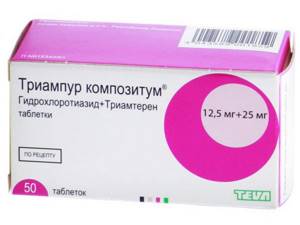
With loop diuretics, the situation is more complicated, since there are older generation drugs, for example, Furosemide or Lasix. They show high effectiveness, but have an extensive list of side effects. Today, doctors more often prescribe new medications of this class:
- torasemide;
- trigrim;
- diuver;
- indapamide.
Furosemide: release form, composition and packaging
The main component of the drug is furosemide - a compound of chemicals such as aminosulfonyl, chlorine, furanelmethyl and aminobenzoic acid.
In pharmacies, the drug can be presented either as tablets, which are available in packages of 50 pieces, or as a solution in ampoules of 5, 10 or 25 pieces.
It is necessary to monitor the expiration date of the drug; from the date of manufacture (it is indicated on the packaging), the medicine can be used for 2 years. Recommended storage temperature is 25 degrees.
The product is sold only with a doctor's prescription. Furosemide can be prescribed for the following diseases:
- cirrhosis of the liver;
- heart problems;
- pain during menstruation or premenstrual period;
- hypertensive crisis;
- high blood pressure;
- with a high potassium content.
The dosage is determined by the doctor. Sometimes the dosage may change throughout treatment. The instructions for the drug indicate that it is recommended to take the medicine in the morning before meals. For an adult, the initial dosage is 20-40 milligrams, but later, if the effect is not enhanced, the dose can be increased to 160 milligrams per day. The break between doses should be about 6 hours.











